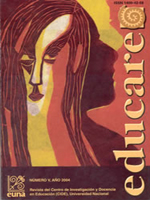Un acercamiento a una perspectiva ecológica en la educación
DOI:
https://doi.org/10.15359/ree.2004-5.1Abstract
Proposal of an approach to education from an ecological perspective. This perspective is understood as the adaptation and adjustment between a growing and active human being and the natural and social scenarios that surround. Education is seen as a social structure favoring adaptation mechanisms by means of explaining, predicting, interpreting and transmitting social culture and practices, and by configuring the different scenarios where teaching-learning principles take place. Thus, the classroom becomes a place that fosters interactions among individuals (teachers and students). As a result, an ecological perspective in education is an opportunity to develop research that values cultural animation, students' learning context, and the ever changing human interaction in order to promote an altruistic search for solutions to the various problems encountered.
References
Ander-Egg, E. (1996). La planificación educativa: conceptos, métodos,
estrategias y técnicas para educadores. Buenos Aires, Argentina: Magisterio del Río de La Plata.
Bauer, A. y Shea, T. (1999). Educación especial: un enfoque ecológico.
da ed. Nueva York, E.E.U.U.: Mac Graw Hill.
Bronfernbrenner, U. ( 1979). An integrative perspecti ve on children, s divorce adjustment. American psychologist, 36. 856- 866.
Capra, F (1994) La red de los problemas que hay en el mundo. Nueva
Conciencia, 22. 26 - 31.
Carvajal, C. (1998). Teorías educativas, concepciones curriculares y corrientes pedagógicas. Mimeografiado, Escuela de Formación Docente, Facultad de Educación, Universidad de Costa Rica.
Carr, W. y Kemmis, S. (1988). Teoría crítica de la enseñanza. La investigación acción en el profesorado. Barcelona, España: Martínez Roca.
Copeland, C. (1982). Teaching-learning behaviors and the demands of the classroom environment. En W. Doy le y T. Good (Eds). Focus in Teaching, l. 83-97.
De Alba, A. (1994). Currículo, crisis, mito y perspectiva. México: Universidad Nacional Autónoma de México.
Delors, J. (1996). La educación encierra un tesoro. Madrid, España: Editorial Santillana- UNESCO.
Erickson, F. y Schultz, J. ( 1981 ). When is context? Sorne issues and methods in the anal y sis of social competence, p. p. 14 7-160. En John Green y Chareles Wallat (Eds.) Ethnography and language in educational settings. Noawood, New Jersey: Editorial Publishing Ablex.
Freire, P. (1998). La educación como práctica de la libertad. Madrid, España: Siglo XXI.
García, J. (1917). Discurso con motivo de la Tercera graduación de la
Escuela Normal. Mimeografiado, División de Educación Básica, Centro de Investigación y Docencia en Educación, Universidad Nacional.
García, V., Álvarez, S., Guerrero A., Desantes, J., Femández, O., Losado, I., García, J., Marín, C., Martínez, A., Pérez, R. y Soler, E. (1996). Formación de profesores para la educación personalizada. Madrid, España: Rialp.
Goleman, D. (1998). La inteligencia emocional. Buenos Aires, Argentina: Javier Vergara.
Gore, A. ( 1993). La Tierra en juego. Buenos Aires, Argentina: Javier Vergara.
Green, J. Y Weade, R. (1988 abril). Teaching as conversation and the
construction of meaning in the classroom. Ponencia presentada en la reunión Anual de la American Educational Research Association.
Grundy, S. (1994). Producto o praxis del currículo. 7a. ed. Madrid, España: Morata.
Jones, V. (1986). Classroom management in the United States: Trends
and critical issues. En D. P. Tattam (eds). Management of disruptive pupil behavior in schools. Chichester, Inglaterra: John Wiley.
Kurdek, L. (1981). An integrative perspective on children's divorce
adjustment. American Psychologist, 36. 856- 866.
León, A. (1998). El maestro y los niños: la humanización del aula. San
José: Universidad de Costa Rica.
Nagi, S. ( 1984 mayo). Valores sociales e instituciones y el lugar que ocupa los niños: una perspectiva ecológica. Ponencia presentada en XVI Congreso Panamericano del Niño, Washington D. C., E.E.U.U.
Pinnell, G. y Galloway, C. (1987). Human development, language on
communication: Then and now. Theory into practice, 26. 353- 357.
Peralta, V. (1987). El currículo en el jardín infantil: análisis crítico.
Mimeografiado, Facultad de Educación, Universidad de Costa Rica.
Pérez, R. (1994). El currículo y sus componentes. Barcelona, España:
Oikostar.
Riegel, K. (1975). Toward a dialectical theory of development. Human
Development, 18. 65 - 79.
Savater, F. (1997). El valor de educar. Barcelona; España: Ariel.
Thomas, E. y Marshall, M. ( 1977). Clinical evaluation and coordination of services: an ecological model. Exceptional Children, 44. 16 - 22.
Torres, J. (1996). Globali;:,ación e interdisciplinariedad: el currículo integrado. Madrid, España: Morata.
Wittrock, M. (1997). La investigación de la enseñanza: enfoque, teorías y métodos. Barcelona. España: Paidos.
Published
How to Cite
Issue
Section
License
1. In case the submitted paper is accepted for publication, the author(s) FREELY, COSTLESS, EXCLUSIVELY AND FOR AN INDEFINITE TERM transfer copyrights and patrimonial rights to Universidad Nacional (UNA, Costa Rica). For more details check the Originality Statement and Copyright Transfer Agreement
2. REUTILIZATION RIGHTS: UNA authorizes authors to use, for any purpose (among them selfarchiving or autoarchiving) and to publish in the Internet in any electronic site, the paper´'s final version, both approved and published (post print), as long as it is done with a non commercial purpose, does not generate derivates without previous consentment and recognizes both publisher's name and authorship.
3. The submission and possible publication of the paper in the Educare Electronic Journal is ruled by the Journal’s editorial policies, the institutional rules of Universidad Nacional and the laws of the Republic of Costa Rica. Additionally, any possible difference of opinion or future dispute shall be settled in accordance with the mechanisms of Alternative Dispute Resolution and the Costa Rican Jurisdiction.
4. In all cases, it is understood that the opinions issued are those of the authors and do not necessarily reflect the position and opinion of Educare, CIDE or Universidad Nacional, Costa Rica. It is also understood that, in the exercise of academic freedom, the authors have carried out a rogorous scientific-academic process of research, reflection and argumentation thar lays within the thematic scope of interest of the Journal.
5. The papers published by Educare Electronic Journal use a Creative Commons License:














 The articles published by Educare Electronic Journal can be shared with a Creative Commons License:
The articles published by Educare Electronic Journal can be shared with a Creative Commons License: 



